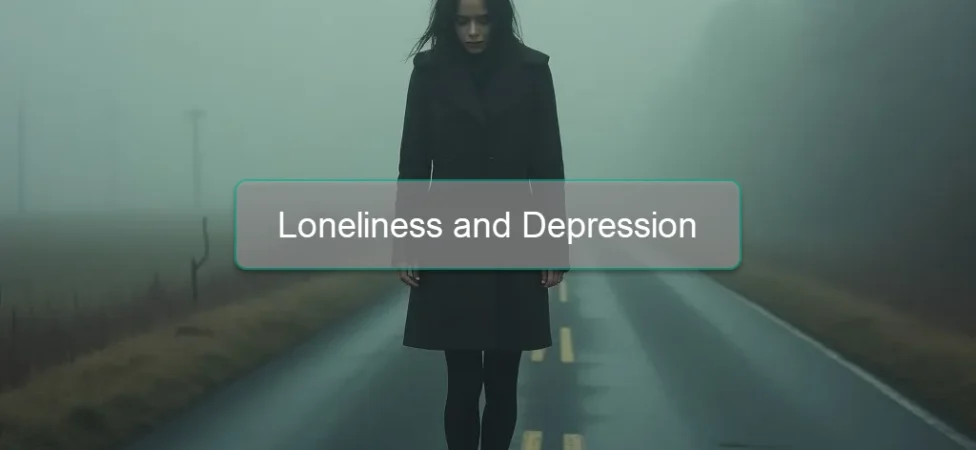Loneliness and depression often go hand in hand, hitting millions in our busy world. Loneliness is that empty feeling of being disconnected, even around people. Depression brings lasting sadness, low energy, and no joy in daily life. They create a cycle: one sparks the other, making it tough to break free.
But knowing this is your first step to feeling better. In 2025, about a third of U.S. adults feel lonely, and over 1 in 8 people aged 12 and up face depression symptoms.
Key Takeaways
- Loneliness and depression create a cycle, but understanding it helps you break free.
- Small steps like calling a friend or using AI companions can ease isolation.
- Seniors, teens, the chronically ill, and remote workers face higher risks.
- These issues harm mental, emotional, and physical health, like heart disease risk.
- Therapy, support groups, and mindfulness are effective ways to cope and prevent.
Loneliness and Depression Defined
To grasp how these two challenges connect, let’s start with the basics.
What Is Loneliness?
Loneliness is the feeling of being isolated or not having strong connections with others. It’s not just about being alone—it’s an emotional gap where you feel disconnected.
Anyone can experience it, often sparked by changes like moving or losing a loved one.
Around the world, about 16% of people feel lonely regularly, with higher rates in some groups. It might pass quickly for some, but it can become long-lasting for others.
For more insights on loneliness and ways to address it, check out our detailed guide on Loneliness Meaning.
What Is Depression?
Depression is ongoing sadness, low energy, and a loss of interest in everyday activities. It often affects sleep, eating, and how you feel overall. It’s a serious health issue, not just a bad day.
In the U.S., it’s more common in women (16%) than men (10%), and it can increase with age in certain cases.
How Loneliness and Depression Are Connected
Ever wonder why these two often team up? Let’s break down the key links.
The Vicious Cycle Between Loneliness and Depression
It’s like a tough loop: Loneliness fills your head with negative thoughts, so you start pulling away from people, which makes the sadness worse. To better understand this emotional gap, explore loneliness meaning.
Depression then kicks in, making it feel too hard to reach out, and the isolation just keeps going.
You can break this with small steps, like chatting with a friend.
Neuroscience Behind the Link
Your brain reacts to loneliness like it’s actual pain, lighting up stress zones and causing inflammation in your body.
This throws off important chemicals like dopamine and serotonin, which help keep your mood steady.
Lonely brains often show shifts that lead to more anxiety and fuzzy thinking, similar to what’s seen in depression.
Loneliness as a Risk Factor for Depression
If loneliness sticks around long-term, it really boosts your chances of developing depression—it’s a standalone risk.
Research points to a 15-30% higher risk from it.
The good news? Dealing with loneliness early can help lower that danger.
Who Is Most at Risk?

Certain groups feel the weight of loneliness and depression more than others. Let’s look at who might be hit hardest.
Older Adults
Seniors often deal with loneliness because of things like retirement or losing loved ones. In North America, about 30% face this issue, which can double their chances of depression.
In Europe, nearly 20% live alone, making the risks even higher.
Teenagers and Young Adults
Teens and young adults report feeling lonely a lot—around 17-21% say so, often due to social media and life pressures. About one in seven kids aged 10-19 has a mental health issue.
This group is seeing more depression, with loneliness playing a big role in starting it
People with Chronic Illness or Disability
If you’re living with a chronic illness or disability, isolation can slowly build up due to mobility challenges or the stigma that sometimes comes with your condition. This increased isolation puts you at a much higher risk for both loneliness and depression.
When both issues overlap, they often intensify each other—making the emotional toll of depression feel heavier and harder to manage.
Isolated Individuals or Remote Workers
Remote workers might feel cut off without those everyday chats at the office. Things like money troubles or living solo can make it worse.
Research shows that if you’re living alone and depressed, the risk of serious issues like suicide goes up.
The Impact on Mental and Physical Health
Loneliness and depression don’t just mess with your mood—they can affect your whole body and mind in surprising ways.
Cognitive and Emotional Effects
Loneliness can make it hard to think clearly, ramp up your anxiety levels, and even speed up things like memory loss or dementia as you age. It’s like a fog that clouds your brain, making everyday decisions tougher.
On the emotional side, it often leads to lower self-esteem and constant stress. When depression joins in, it brings a heavy sense of hopelessness, making that mental haze even thicker and harder to shake off.
Physical Health Consequences
Feeling lonely and depressed can raise your risk of heart disease by about 29%, stroke by 32%, and even conditions like diabetes. The stress causes inflammation that weakens your immune system and can shorten your lifespan overall.
Experts say it’s as harmful as smoking a pack of cigarettes a day, showing how these emotional struggles hit your physical health hard. This widespread issue is often referred to as the loneliness epidemic, affecting millions globally.
Suicide Risk and Mental Health Crises
Loneliness can triple your chances of having suicidal thoughts, especially when mixed with depression. It plays a big role in mental health emergencies around the world, with extra risks for people who live alone and feel cut off.
The key is spotting the signs early and getting help—awareness and support can make a huge difference in preventing these crises.
Signs You Might Be Struggling With Both
Wondering if you’re dealing with loneliness, depression, or both? Here are some clear signs to look out for and when to take action.

Overlapping Symptoms to Watch For
Loneliness and depression can team up, making things feel heavier. Keep an eye out for these red flags:
- Constant sadness or emptiness that doesn’t lift, like a cloud hanging over you.
- Fatigue or appetite changes, where you’re exhausted all the time or eating way more or less.
- Social withdrawal, like avoiding friends or feeling too drained for social plans.
- Feelings of worthlessness, where you doubt your value or feel like nothing matters.
If these stick around for weeks, it’s a sign they’re blending and could be more than just a bad day.
When to Seek Professional Help
If these feelings mess with your work, relationships, or daily routine, it’s time to reach out. Especially if you’re having thoughts of harming yourself—don’t wait, help is out there.
Hotlines, therapists, or even a trusted doctor can step in to guide you. Acting early stops things from getting worse, and support is just a call or click away.
Coping Strategies and Solutions
There are effective ways to tackle loneliness and depression head-on.
Building Social Connections
Start by reaching out to others through a quick call, text, or in-person meetup. It might feel tough at first, but these little efforts can build stronger bonds over time.
Join a hobby class, volunteer in your community, or even chat with neighbors—these activities help create meaningful ties and reduce that isolated feeling.
Remember, consistent small interactions add up and can ease both loneliness and depression.
Cognitive Behavioral Therapy (CBT) and Talk Therapy
CBT is like rewiring your brain—it helps change those negative thoughts about being alone into more positive ones. Talk therapy lets you dig into the roots of your feelings and learn new coping skills.
Both are super effective for handling loneliness and depression, often showing results in just a few sessions.
If you’re interested, a therapist can guide you through it step by step.
Mindfulness and Self-Compassion
Try mindfulness practices like meditation to stay in the moment and quiet those racing thoughts. Being kind to yourself—self-compassion—helps too, by treating your struggles with understanding instead of judgment.
These techniques can lower stress, reduce rumination, and boost your mood over time.
Apps and short daily sessions make it easy to get started, even if you’re new to it.
Medication and Medical Treatment
For some, medications like antidepressants can help balance brain chemicals and lift that heavy fog of depression. They’re often paired with therapy for the best outcomes.
Always chat with a doctor first—they’ll tailor it to your needs and monitor how it goes.
This approach can also indirectly ease loneliness by giving you more energy to connect with others.
Joining Support Groups
Support groups bring together people facing similar challenges, where you can share stories and feel understood. Whether online or in-person, they provide empathy and practical tips.
Many folks feel less alone right away, as hearing others’ experiences reminds you you’re not the only one.
It’s a safe space to open up and build a sense of community.
Preventing Loneliness and Depression
You can take charge and keep loneliness and depression at bay with some simple, everyday steps. Here’s how to build habits and tools that help you stay connected and strong.
Daily Habits to Foster Connection
Make time to check in with friends—maybe a quick text or a walk together. Writing down things you’re grateful for can shift your focus to the good stuff in life.
Also, sticking to healthy sleep and regular exercise boosts your mood and keeps isolation in check.
Role of Routine and Purpose
Having a daily routine with clear goals gives you a sense of stability. Pick up hobbies like painting or gardening—they add meaning and help ease stress.
Sticking to these habits builds mental strength over time, making you more resilient.
Digital Tools and Online Communities
Apps and online forums are great for connecting with others from home. An AI Girlfriend can offer friendly, judgment-free chats that can ease loneliness—studies show they mimic real human support in some ways. To learn more, explore What is an AI girlfriend.
Just make sure to balance these with real-world connections for the best results.
How Society Can Help
It’s not just up to you—society has a key role in fighting loneliness and depression. Let’s see how communities, education, and policies can make a difference.

Community-Based Programs
Local spots like clubs or senior centers help bring people together and create a sense of belonging. They host events where folks can chat, share stories, and build real ties, which cuts down on isolation.
These programs are proven to lower risks, making everyone feel more supported and less alone.
Mental Health Awareness and Education
Campaigns such as Mental Health Awareness Week in 2025 help break the stigma around these issues. For example, in the UK, it ran from May 12-18 with a focus on community, while in the US, it highlighted topics like children’s mental health.
Schools and programs teach skills for building connections and spotting early signs. This encourages people to seek help sooner and fosters understanding.
Policy Changes and Healthcare Access
The WHO passed a 2025 resolution on fostering social connections to combat loneliness, urging countries to prioritize this for better global health. It highlights how being connected improves well-being and reduces early death risks.
With more funding and smart policies, we can make mental health care easier to get, especially for vulnerable groups like the elderly or those in remote areas.
A Hopeful Note to End On
Loneliness and depression can feel like a heavy weight, but you don’t have to carry it alone. By understanding how they feed into each other, you can start small—maybe a chat with a friend, a new hobby, or even trying an AI companion from our AI girlfriends site for supportive, judgment-free talks. Every step counts, and you’re stronger than you think.
Reach out, whether to a loved one, a therapist, or a community group. Help is out there, and brighter days are possible—start today, and keep going.
Frequently Asked Questions
Can you get depressed from loneliness?
Yes, loneliness can significantly increase the risk of depression. Research shows chronic loneliness boosts depression odds by 15-30% by triggering negative thoughts and isolation, but early action, like connecting with others, can help prevent it.
How can I tell if I’m lonely, depressed, or both?
Look for signs like ongoing sadness, fatigue, or pulling away from friends. Loneliness feels like an emotional gap, while depression adds hopelessness and low energy. If these last weeks, especially together, you talk to a doctor or therapist to sort it out.
What’s a quick way to start feeling less lonely?
Try small steps like texting a friend, joining a local club, or using an AI companion for a friendly chat. Even a short walk or online forum can spark connection and lift your mood fast.





